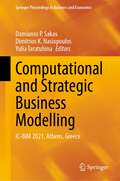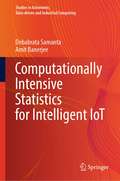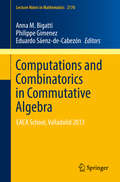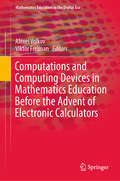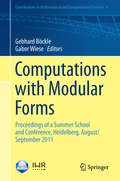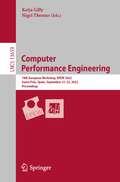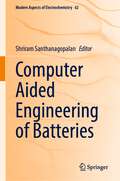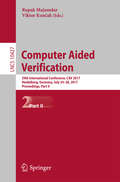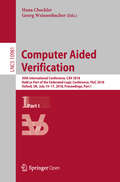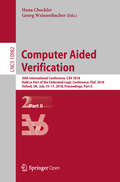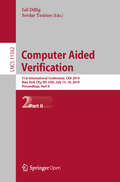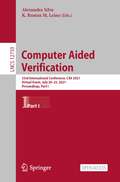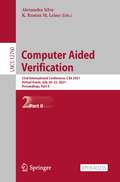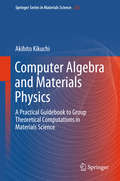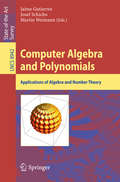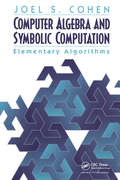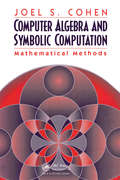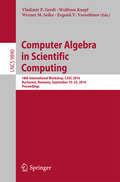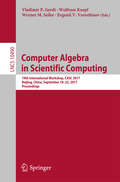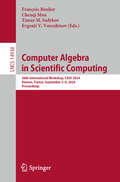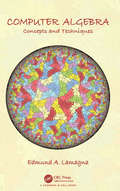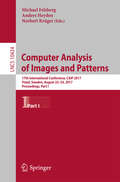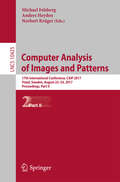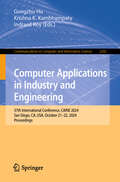- Table View
- List View
Computational and Strategic Business Modelling: IC-BIM 2021, Athens, Greece (Springer Proceedings in Business and Economics)
by Damianos P. Sakas Dimitrios K. Nasiopoulos Yulia TaratuhinaThis book presents advanced methods in business intelligence models that are applicable in research areas of business and enterprise research such as business informatics, e-business, customer behavior and agricultural business. Featuring selected contributions presented at the 2021 International Conference on Business Intelligence and Modelling (IC-BIM) held in Athens, Greece, this book analyses a series of issues and tools for business intelligence in everyday business operations. The International Conference on Business Intelligence and Modelling (IC-BIM) started in 2011 and is an international interdisciplinary conference focusing on the theoretical approach of the contemporary issues evolved in business intelligence and modelling and the integration of theory and practice.
Computationally Intensive Statistics for Intelligent IoT (Studies in Autonomic, Data-driven and Industrial Computing)
by Amit Banerjee Debabrata SamantaThe book covers computational statistics, its methodologies and applications for IoT device. It includes the details in the areas of computational arithmetic and its influence on computational statistics, numerical algorithms in statistical application software, basics of computer systems, statistical techniques, linear algebra and its role in optimization techniques, evolution of optimization techniques, optimal utilization of computer resources, and statistical graphics role in data analysis. It also explores computational inferencing and computer model's role in design of experiments, Bayesian analysis, survival analysis and data mining in computational statistics.
Computations and Combinatorics in Commutative Algebra: EACA School, Valladolid 2013 (Lecture Notes in Mathematics #2176)
by Anna M. Bigatti Eduardo Sáenz-de-Cabezón Philippe GimenezFeaturing up-to-date coverage of three topics lying at the intersection of combinatorics and commutative algebra, namely Koszul algebras, primary decompositions and subdivision operations in simplicial complexes, this book has its focus on computations. "Computations and Combinatorics in Commutative Algebra" has been written by experts in both theoretical and computational aspects of these three subjects and is aimed at a broad audience, from experienced researchers who want to have an easy but deep review of the topics covered to postgraduate students who need a quick introduction to the techniques. The computational treatment of the material, including plenty of examples and code, will be useful for a wide range of professionals interested in the connections between commutative algebra and combinatorics.
Computations and Computing Devices in Mathematics Education Before the Advent of Electronic Calculators (Mathematics Education in the Digital Era #11)
by Viktor Freiman Alexei VolkovThis volume traces back the history of interaction between the “computational” or “algorithmic” aspects of elementary mathematics and mathematics education throughout ages. More specifically, the examples of mathematical practices analyzed by the historians of mathematics and mathematics education who authored the chapters in the present collection show that the development (and, in some cases, decline) of counting devices and related computational practices needs to be considered within a particular context to which they arguably belonged, namely, the context of mathematics instruction; in their contributions the authors also explore the role that the instruments played in formation of didactical approaches in various mathematical traditions, stretching from Ancient Mesopotamia to the 20th century Europe and North America.
Computations with Modular Forms: Proceedings of a Summer School and Conference, Heidelberg, August/September 2011 (Contributions in Mathematical and Computational Sciences #6)
by Gebhard Böckle Gabor WieseThis volume contains original research articles, survey articles and lecture notes related to the Computations with Modular Forms 2011 Summer School and Conference, held at the University of Heidelberg. A key theme of the Conference and Summer School was the interplay between theory, algorithms and experiment. The 14 papers offer readers both, instructional courses on the latest algorithms for computing modular and automorphic forms, as well as original research articles reporting on the latest developments in the field. The three Summer School lectures provide an introduction to modern algorithms together with some theoretical background for computations of and with modular forms, including computing cohomology of arithmetic groups, algebraic automorphic forms, and overconvergent modular symbols. The 11 Conference papers cover a wide range of themes related to computations with modular forms, including lattice methods for algebraic modular forms on classical groups, a generalization of the Maeda conjecture, an efficient algorithm for special values of p-adic Rankin triple product L-functions, arithmetic aspects and experimental data of Bianchi groups, a theoretical study of the real Jacobian of modular curves, results on computing weight one modular forms, and more.
Computer Performance Engineering: 18th European Workshop, EPEW 2022, Santa Pola, Spain, September 21–23, 2022, Proceedings (Lecture Notes in Computer Science #13659)
by Nigel Thomas Katja GillyThis book constitutes the refereed proceedings of the 18th European Workshop on Computer Performance Engineering, EPEW 2022, held in Santa Pola, Spain, in September 2022.The 14 papers presented in this volume together with one invited talk were carefully reviewed and selected from 14 submissions. The papers presented at the workshop reflect the diversity of modern performance engineering. The sessions covered a wide range of topics including robustness analysis, machine learning, edge and cloud computing, as well as more traditional topics on stochastic modelling, techniques and tools.
Computer Age Statistical Inference
by Bradley Efron Trevor HastieThe twenty-first century has seen a breathtaking expansion of statistical methodology, both in scope and in influence. 'Big data', 'data science', and 'machine learning' have become familiar terms in the news, as statistical methods are brought to bear upon the enormous data sets of modern science and commerce. How did we get here? And where are we going? This book takes us on an exhilarating journey through the revolution in data analysis following the introduction of electronic computation in the 1950s. Beginning with classical inferential theories - Bayesian, frequentist, Fisherian - individual chapters take up a series of influential topics: survival analysis, logistic regression, empirical Bayes, the jackknife and bootstrap, random forests, neural networks, Markov chain Monte Carlo, inference after model selection, and dozens more. The distinctly modern approach integrates methodology and algorithms with statistical inference. The book ends with speculation on the future direction of statistics and data science.
Computer Aided Engineering of Batteries (Modern Aspects of Electrochemistry #62)
by Shriram SanthanagopalanThis edited volume, with contributions from the Computer Aided Engineering for Batteries (CAEBAT) program, provides firsthand insights into nuances of implementing battery models in actual geometries. It discusses practical examples and gaps in our understanding, while reviewing in depth the theoretical background and algorithms. Over the last ten years, several world-class academics, automotive original equipment manufacturers (OEMs), battery cell manufacturers and software developers worked together under an effort initiated by the U.S. Department of Energy to develop mature, validated modeling tools to simulate design, performance, safety and life of automotive batteries. Until recently, battery modeling was a niche focus area with a relatively small number of experts. This book opens up the research topic for a broader audience from industry and academia alike. It is a valuable resource for anyone who works on battery engineering but has limited hands-on experience with coding.
Computer Aided Verification: 29th International Conference, CAV 2017, Heidelberg, Germany, July 24-28, 2017, Proceedings, Part II (Lecture Notes in Computer Science #10427)
by Rupak Majumdar Viktor KunčakThe two-volume set LNCS 10426 and LNCS 10427 constitutes the refereed proceedings of the 29th International Conference on Computer Aided Verification, CAV 2017, held in Heidelberg, Germany, in July 2017. The total of 50 full and 7 short papers presented together with 5 keynotes and tutorials in the proceedings was carefully reviewed and selected from 191 submissions. The CAV conference series is dedicated to the advancement of the theory and practice of computer-aided formal analysis of hardware and software systems. The conference covers the spectrum from theoretical results to concrete applications, with an emphasis on practical verification tools and the algorithms and techniques that are needed for their implementation.
Computer Aided Verification: 30th International Conference, CAV 2018, Held as Part of the Federated Logic Conference, FloC 2018, Oxford, UK, July 14-17, 2018, Proceedings, Part I (Lecture Notes in Computer Science #10981)
by Hana Chockler Georg WeissenbacherThis open access two-volume set LNCS 10980 and 10981 constitutes the refereed proceedings of the 30th International Conference on Computer Aided Verification, CAV 2018, held in Oxford, UK, in July 2018. The 52 full and 13 tool papers presented together with 3 invited papers and 2 tutorials were carefully reviewed and selected from 215 submissions. The papers cover a wide range of topics and techniques, from algorithmic and logical foundations of verification to practical applications in distributed, networked, cyber-physical, and autonomous systems. They are organized in topical sections on model checking, program analysis using polyhedra, synthesis, learning, runtime verification, hybrid and timed systems, tools, probabilistic systems, static analysis, theory and security, SAT, SMT and decisions procedures, concurrency, and CPS, hardware, industrial applications.
Computer Aided Verification: 30th International Conference, CAV 2018, Held as Part of the Federated Logic Conference, FloC 2018, Oxford, UK, July 14-17, 2018, Proceedings, Part II (Lecture Notes in Computer Science #10982)
by Hana Chockler Georg WeissenbacherThis open access two-volume set LNCS 10980 and 10981 constitutes the refereed proceedings of the 30th International Conference on Computer Aided Verification, CAV 2018, held in Oxford, UK, in July 2018. The 52 full and 13 tool papers presented together with 3 invited papers and 2 tutorials were carefully reviewed and selected from 215 submissions. The papers cover a wide range of topics and techniques, from algorithmic and logical foundations of verification to practical applications in distributed, networked, cyber-physical, and autonomous systems. They are organized in topical sections on model checking, program analysis using polyhedra, synthesis, learning, runtime verification, hybrid and timed systems, tools, probabilistic systems, static analysis, theory and security, SAT, SMT and decisions procedures, concurrency, and CPS, hardware, industrial applications.
Computer Aided Verification: 31st International Conference, CAV 2019, New York City, NY, USA, July 15-18, 2019, Proceedings, Part II (Lecture Notes in Computer Science #11562)
by Isil Dillig Serdar TasiranThe open access two-volume set LNCS 11561 and 11562 constitutes the refereed proceedings of the 31st International Conference on Computer Aided Verification, CAV 2019, held in New York City, USA, in July 2019. The 52 full papers presented together with 13 tool papers and 2 case studies, were carefully reviewed and selected from 258 submissions. The papers were organized in the following topical sections: Part I: automata and timed systems; security and hyperproperties; synthesis; model checking; cyber-physical systems and machine learning; probabilistic systems, runtime techniques; dynamical, hybrid, and reactive systems; Part II: logics, decision procedures; and solvers; numerical programs; verification; distributed systems and networks; verification and invariants; and concurrency.
Computer Aided Verification: 33rd International Conference, CAV 2021, Virtual Event, July 20–23, 2021, Proceedings, Part I (Lecture Notes in Computer Science #12759)
by K. Rustan M. Leino Alexandra SilvaThis open access two-volume set LNCS 12759 and 12760 constitutes the refereed proceedings of the 33rd International Conference on Computer Aided Verification, CAV 2021, held virtually in July 2021. The 63 full papers presented together with 16 tool papers and 5 invited papers were carefully reviewed and selected from 290 submissions. The papers were organized in the following topical sections: Part I: invited papers; AI verification; concurrency and blockchain; hybrid and cyber-physical systems; security; and synthesis. Part II: complexity and termination; decision procedures and solvers; hardware and model checking; logical foundations; and software verification.This is an open access book.
Computer Aided Verification: 33rd International Conference, CAV 2021, Virtual Event, July 20–23, 2021, Proceedings, Part II (Lecture Notes in Computer Science #12760)
by K. Rustan M. Leino Alexandra SilvaThis open access two-volume set LNCS 12759 and 12760 constitutes the refereed proceedings of the 33rd International Conference on Computer Aided Verification, CAV 2021, held virtually in July 2021.The 63 full papers presented together with 16 tool papers and 5 invited papers were carefully reviewed and selected from 290 submissions. The papers were organized in the following topical sections: Part I: invited papers; AI verification; concurrency and blockchain; hybrid and cyber-physical systems; security; and synthesis. Part II: complexity and termination; decision procedures and solvers; hardware and model checking; logical foundations; and software verification.
Computer Algebra and Materials Physics: A Practical Guidebook to Group Theoretical Computations in Materials Science (Springer Series in Materials Science #272)
by Akihito KikuchiThis book is intended as an introductory lecture in material physics, in which the modern computational group theory and the electronic structure calculation are in collaboration.The first part explains how to use computer algebra for applications in solid-state simulation, based on the GAP computer algebra package. Computer algebra enables us to easily obtain various group theoretical properties, such as the representations, character tables, and subgroups. Furthermore it offers a new perspective on material design, which could be executed in a mathematically rigorous and systematic way.The second part then analyzes the relation between the structural symmetry and the electronic structure in C60 (as an example of a system without periodicity). The principal object of the study was to illustrate the hierarchical change in the quantum-physical properties of the molecule, which correlates to the reduction in the symmetry (as it descends down in the ladder of subgroups).The book also presents the computation of the vibrational modes of the C60 by means of the computer algebra. In order to serve the common interests of researchers, the details of the computations (the required initial data and the small programs developed for the purpose) are explained in as much detail as possible.
Computer Algebra and Polynomials: Applications of Algebra and Number Theory (Lecture Notes in Computer Science #8942)
by Jaime Gutierrez Josef Schicho Martin WeimannAlgebra and number theory have always been counted among the most beautiful mathematical areas with deep proofs and elegant results. However, for a long time they were not considered that important in view of the lack of real-life applications. This has dramatically changed: nowadays we find applications of algebra and number theory frequently in our daily life. This book focuses on the theory and algorithms for polynomials over various coefficient domains such as a finite field or ring. The operations on polynomials in the focus are factorization, composition and decomposition, basis computation for modules, etc. Algorithms for such operations on polynomials have always been a central interest in computer algebra, as it combines formal (the variables) and algebraic or numeric (the coefficients) aspects. The papers presented were selected from the Workshop on Computer Algebra and Polynomials, which was held in Linz at the Johann Radon Institute for Computational and Applied Mathematics (RICAM) during November 25-29, 2013, at the occasion of the Special Semester on Applications of Algebra and Number Theory.
Computer Algebra and Symbolic Computation: Elementary Algorithms
by Joel S. CohenThis book provides a systematic approach for the algorithmic formulation and implementation of mathematical operations in computer algebra programming languages. The viewpoint is that mathematical expressions, represented by expression trees, are the data objects of computer algebra programs, and by using a few primitive operations that analyze and
Computer Algebra and Symbolic Computation: Mathematical Methods
by Joel S. CohenMathematica, Maple, and similar software packages provide programs that carry out sophisticated mathematical operations. Applying the ideas introduced in Computer Algebra and Symbolic Computation: Elementary Algorithms, this book explores the application of algorithms to such methods as automatic simplification, polynomial decomposition, and polyno
Computer Algebra in Scientific Computing: 18th International Workshop, CASC 2016, Bucharest, Romania, September 19-23, 2016, Proceedings (Lecture Notes in Computer Science #9890)
by Wolfram Koepf Vladimir P. Gerdt Werner M. Seiler Evgenii V. VorozhtsovThe book covers various topics of computer algebra methods, algorithms and software applied to scientific computing. One of the important topics of the book is the application of computer algebra methods for the development of new efficient analytic and numerical solvers, both for ordinary and partial differential equations. A specific feature of the book is a detailed analysis of the advanced software systems like Mathematica, Maple etc. from the viewpoint of their applicability for the solution of scientific computing problems. The book will be useful for researchers and engineers who apply the advanced computer algebra methods for the solution of their tasks.
Computer Algebra in Scientific Computing: 19th International Workshop, CASC 2017, Beijing, China, September 18-22, 2017, Proceedings (Lecture Notes in Computer Science #10490)
by Wolfram Koepf Vladimir P. Gerdt Werner M. Seiler Evgenii V. VorozhtsovThe book covers various topics of computer algebra methods, algorithms and software applied to scientific computing. One of the important topics of the book is the application of computer algebra methods for the development of new efficient analytic and numerical solvers, both for ordinary and partial differential equations. A specific feature of the book is a detailed analysis of the advanced software systems like Mathematica, Maple etc. from the viewpoint of their applicability for the solution of scientific computing problems. The book will be useful for researchers and engineers who apply the advanced computer algebra methods for the solution of their tasks.
Computer Algebra in Scientific Computing: 26th International Workshop, CASC 2024, Rennes, France, September 2–6, 2024, Proceedings (Lecture Notes in Computer Science #14938)
by Evgenii V. Vorozhtsov Timur M. Sadykov François Boulier Chenqi MouThis book constitutes the refereed proceedings of the 26th International Workshop on Computer Algebra in Scientific Computing, CASC 2024, which took place in Rennes, France, during September 2 - September 6, 2024. The 19 full papers included in this book were carefully reviewed and selected from 23 submissions. The annual International Workshop CASC 2024 aims to bring together researchers in theoretical computer algebra (CA), engineers, scholars, as well as other allied professionals applying CA tools for solving problems in industry and in various branches of scientific computing to explore and discuss advancements, challenges, and innovations related to CA.
Computer Algebra: Concepts and Techniques
by Edmund A. LamagnaThe goal of Computer Algebra: Concepts and Techniques is to demystify computer algebra systems for a wide audience including students, faculty, and professionals in scientific fields such as computer science, mathematics, engineering, and physics. Unlike previous books, the only prerequisites are knowledge of first year calculus and a little programming experience — a background that can be assumed of the intended audience. The book is written in a lean and lively style, with numerous examples to illustrate the issues and techniques discussed. It presents the principal algorithms and data structures, while also discussing the inherent and practical limitations of these systems
Computer Analysis of Images and Patterns: 17th International Conference, CAIP 2017, Ystad, Sweden, August 22-24, 2017, Proceedings, Part I (Lecture Notes in Computer Science #10424)
by Michael Felsberg Anders Heyden Norbert KrügerThe two volume set LNCS 10424 and 10425 constitutes the refereed proceedings of the 17th International Conference on Computer Analysis of Images and Patterns, CAIP 2017, held in Ystad, Sweden, in August 2017. The 72 papers presented were carefully reviewed and selected from 144 submissions The papers are organized in the following topical sections: Vision for Robotics; Motion and Tracking; Segmentation; Image/Video Indexing and Retrieval; Shape Representation and Analysis; Biomedical Image Analysis; Biometrics; Machine Learning; Image Restoration; and Poster Sessions.
Computer Analysis of Images and Patterns: 17th International Conference, CAIP 2017, Ystad, Sweden, August 22-24, 2017, Proceedings, Part II (Lecture Notes in Computer Science #10425)
by Michael Felsberg Anders Heyden Norbert KrügerThe two volume set LNCS 10424 and 10425 constitutes the refereed proceedings of the 17th International Conference on Computer Analysis of Images and Patterns, CAIP 2017, held in Ystad, Sweden, in August 2017. The 72 papers presented were carefully reviewed and selected from 144 submissions The papers are organized in the following topical sections: Vision for Robotics; Motion and Tracking; Segmentation; Image/Video Indexing and Retrieval; Shape Representation and Analysis; Biomedical Image Analysis; Biometrics; Machine Learning; Image Restoration; and Poster Sessions.
Computer Applications in Industry and Engineering: 37th International Conference, CAINE 2024, San Diego, CA, USA, October 21–22, 2024, Proceedings (Communications in Computer and Information Science #2242)
by Indranil Roy Gongzhu Hu Krishna K. KambhampatyThis book constitutes the proceedings of the 37th International Conference on Computer Applications in Industry and Engineering, CAINE 2024, which took place in San Diego, USA, in October 2024. The 17 full papers presented in these proceedings were carefully reviewed and selected for inclusion in the book. They were organized in topical sections as follows: Machine learning and AP applications; blockchain and security; parallel computing and algorithms; data processing and image analysis; networking and edge computing; and cryptography and pseudorandom generators.
